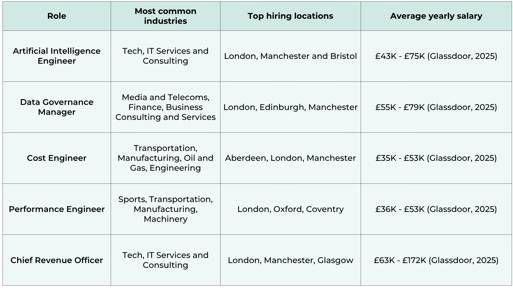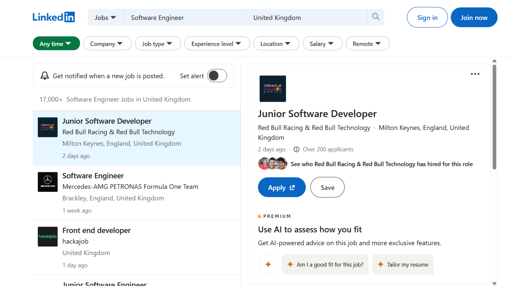What's on this page?
Jump to:
- Define Exactly What You Need Out of This Career Change
- Hone in on Sectors, Industry, and Roles for Career Change Ideas
- Start Building a Relevant Support Network to Help Create New Opportunities
- Plan for Training and Upskilling to Increase Your Options
- Create a Career-Change-Friendly CV, Cover Letter, and LinkedIn
- Apply! Prepare to Talk About Starting a New Career in Interviews
- Final Career Change Advice – We’re Here to Help
- Career Change FAQs
1. Define Exactly What You Need Out of a Career Change
Before you start looking at job titles or retraining options, you first need to make sure you’re really clear on why you want a change of career and what you need in your new positions. What are your north-star requirements, or your absolute non-negotiables?
Based on my daily conversations with job seekers, I find what they want out of their new career usually falls within the following camps:
- More flexibility (in working hours or work location and remote work)
- A higher wage
- More meaningful work; a sense of purpose
- A job that challenges more and develops them professionally
- Or, honestly, just something they don’t dread every Monday morning
For you, this might look different. The important thing is you spend some time deciding what’s really important, and what is absolutely necessary in your new career to make the change worthwhile in the long run.
This stage isn’t about vague wishlists. The clearer you are on your dealbreakers and non-negotiables, the easier it becomes to make smart, focused decisions later on – whether that’s choosing a sector, a course, or a job offer. In short: the decisions you make in this phase should guide every decision you make about your career change from then on.
Try to be honest with yourself about what you want your life to look like, and let that guide your career criteria.
Specific Actions for Establishing What You Need from a Career Change:
- Write down your top five motivators for changing career (e.g., flexibility, pay, job satisfaction) and rank them in order of importance – think hard about what is in the number-one spot, and if that truly reflects your career goals.
- Set a minimum salary target and a potential salary bracket based on your financial needs (“I need to earn between £x and £x per year…”)
- Decide on key lifestyle factors that matter to you, like remote work, hours, or travel, and treat them as filters for future job choices.
- Think about your long-term goals: what kind of career could support your plans for your family, retirement, eldercare, childcare, or personal ambitions?
- Have a conversation with someone close to you (a partner, a friend, someone in your immediate family, or a mentor), and get their take on what they think you really need from your next role. You might be surprised by a new perspective that they bring to the table.
Fact: Opportunities for Remote Working Drive UK Workers to Switch Careers
45% of UK workers say they would consider a career change to become a 'digital nomad': workers who do not have a fixed point from which they work.
With hybrid and remote working options becoming industry standard in tech, the tech sector is a great option for career changes that are looking for a better work-life balance.

2. Hone in on Sectors, Industry, and Roles for Career Change Ideas
Once you know what you’re looking for from a new career, it’s time to explore which roles and industries can actually deliver it. Your ideal job should align with your values and goals, but it also needs to be realistic in terms of salary, training requirements, and how long it’ll take to get there.
Some careers require years of study and formal degrees. Others, like many roles in tech and project management, are far more accessible, especially if you're open to online learning and flexible training.
I’d advise you not rule out a sector before you’ve properly looked into what it takes to get started.
Specific Actions for Honing in on a Sector, Industry, or Role for Your Career Change:
- Use career-matching tools like our MyCareerMatch quiz to explore career paths that align with your personality and strengths.
- Complete a personal skills audit.
- Talk to people already working in those industries, whether it’s on LinkedIn, in forums, or through local events; ask them how they got started and what a day-in-the-life looks like in that role.
- Speak to a Career Consultant (like the ones here at Learning People) to get expert advice on the fastest, most realistic way into a new career.
- Browse job listings on job search engines like Adzuna and Indeed, or platforms like LinkedIn. Focus on your sectors of interest and learn about the day-to-day responsibilities, required qualifications, and starting salaries of these jobs. Here's some of the UK's fastest-growing IT and Project Management roles on LinkedIn:


3. Start Building a Relevant Support Network to Help Create New Opportunities
A career change isn’t something you should figure out alone. One of the best things you can do early on is connect with people who’ve already done what you’re trying to do.
For example, maybe you're a teacher looking to career change into Project Management, or a nurse wanting to switch to IT. Connecting with those who’ve already made the move can offer you real-world insight (and a bit of encouragement).
This isn’t just about adding random names to your LinkedIn profile. It’s about finding a community – people who can share honest experiences, tips they wish they’d known, or even open a door to an opportunity.
And it works both ways: the more open you are about your plans, the more likely others are to help.
Specific Actions for Building a Relevant Network for Your Career Change:
- Join online communities, forums, or Discord groups related to your target sector (IT, Coding, Cyber Security, etc.) and start engaging.
- Search for and connect with people on LinkedIn who’ve moved from your current industry into the one you're aiming for. Reach out with a genuine message and ask for a quick chat.
- Attend free or low-cost local networking events, webinars, or industry meetups. Even just one conversation can shift your thinking.
- Share your goals with your existing network. You never know who knows someone in your target field.
- Read real-life career-change success stories to see how others navigated their career change and what helped them most.
Fact: UK Government Reported an 11% Increase in Cyber Security Roles
The UK Government's latest Cyber Security Skills in the UK Labour Market report, revealed that there has been an 11% growth in cyber security roles since 2024. Shockingly, 49% of UK businesses have a basic cyber security skills gap, and 30% have an advanced skills gap.
With the increase in cyber attacks in 2025, it's unsurprising that certified cyber security professionals are in high demand, making it a great sector to switch to.

4. Plan for Training and Upskilling to Increase Your Options
Now that you’ve narrowed down your career direction, the next step is getting qualified. Many careers in IT and Project Management don’t require a degree, but you will need up-to-date training or certifications to stand out.
The good news? There are flexible, affordable routes that fit around your life, even if you’re still working full time.
Focus on what’s essential to get your foot in the door. You don’t need to do everything at once. Start with entry-level certifications that give you credibility and confidence, and build from there. Make sure the training you choose is recognised in the industry and designed for career changers, not just graduates or full-time students.
Specific Actions for Planning the Training and Upskilling You Need to Change Career:
- Identify the must-have certifications or training for your chosen role. Look at job listings to see what employers ask for.
- Research course providers that offer flexible learning (e.g., remote, part-time, self-paced) and financing options.
- Compare at least two or three providers on price, support, and industry recognition before committing.
- Speak to a specialist career consultant in your chosen field. We offer free advice to help you find the right course, and we’ll typically be in touch within one working day.
- Map out a learning schedule that fits realistically with your work and personal life, even if it’s just 5–10 hours a week to start.
How Retraining Allowed Jamil to Switch Careers
After studying Graphic and Digital Design at university, Jamil decided to pivot into Cyber Security. Upon completing his CompTIA A+ exam with us, he received an offer for a Service Desk Analyst position for The Royal Household.
5. Create a Career-Change-Friendly CV, Cover Letter, and LinkedIn
Your CV is likely going to need more than a quick update; it needs a total rethink, or to be started again from scratch.
Something I tell job seekers all the time when I’m advising them: a CV and cover letter for changing career will look quite different from your standard application. When you're changing careers, you need to clearly show why you're making the move and how your existing skills transfer into this new space. Employers won’t connect the dots for you; you need to do that for them.
This doesn’t mean pretending to be something you’re not. It means reframing your experience in a way that speaks directly to what the employer needs.
A career-change CV typically leads with transferable skills, relevant training, and a short personal statement that explains your motivation and career shift.
Specific Actions for Creating a Career-Change-Friendly CV:
- Start fresh with a blank document. It will probably be easier to build a clear narrative for your career change this way.
- Lead with a short, confident personal statement that explains your new direction and enthusiasm for the industry.
- Highlight transferable skills from your previous roles that are directly relevant to your new target role.
- Focus your LinkedIn profile around your future goals, not just your past roles. Update your headline and summary accordingly.
- Remember: all Learning People students get free lifetime access to our Career Services team, including 1:1 CV and LinkedIn support.
Fact: 2+ Million People Work in the UK Project Management Sector
The latest employment data has revealed that the UK project management sector is made up of 2.13 million professionals. This illustrates just how diverse the project management sector is, spanning fields like IT, tech, cyber security, data, making it a great option for career changers.

6. Apply! Prepare to Talk About Starting a New Career in Interviews
Once your CV and LinkedIn are ready, it’s time to start applying. But as a career changer, interviews will feel a bit different.
You’ll likely be asked why you’re switching industries, what makes you a good fit, and whether you’re really committed to starting over in a new field.
The key is to own your story. Be honest, clear, and positive about why you’re making this move, and how your past experiences bring value. Employers aren’t looking for a perfect background; they’re looking for people who are motivated, self-aware, and ready to learn.
Specific Actions for Applying and Preparing for Interviews as a Career Changer:
- Prepare a short, confident explanation of why you’re changing careers. Practice saying it out loud until it feels natural.
- Highlight relevant skills, qualifications, and achievements in your applications, even if they come from a different industry.
- Be ready to talk about gaps or shifts in your CV. Don’t apologise for them, but explain what you’ve done to prepare for the new role.
- Use the STAR method (Situation, Task, Action, Result) to show how your past experience translates into value in your new career.
- Ask a friend or career advisor to run a mock interview with you. Learning People students can access free interview prep as part of our Career Services.
Kirsten's advice for job interviews after a career change:
"When interviewing after a career change, focus on highlighting your transferable skills - such as communication or problem-solving - and clearly link them to the role you’ve applied for.
Be ready to explain the why and how's of your career change journey. Show enthusiasm for the sector you're entering by researching your potential employer beforehand. Emphasise the new skills and/or certifications you’ve gained, and how these make you a great fit for the role.
Most importantly, present your career pivot as what it is: a strength! Newbies bring a fresh perspective that employers often really appreciate. Apply the same motivation you had to pursue a new career to your new job interviews."
Final Career Change Advice – We’re Here to Help
I’ll be honest with you: changing careers isn’t quick or easy. But with the right steps, it’s absolutely achievable. Get clear on what you want, research realistic roles, build a support network, invest in the right training, and tailor your CV and interview prep for your new path.
The new year is the perfect time to kick-start your new career. Our knowledgeable Career Consultants, StudentCare™ and Career Services teams, can help you secure a new role in IT or Project Management in as little as three months.
The process can feel overwhelming at times, but you’re not on your own. We're here to guide you through every stage. Just reach out when you’re ready to take that first step.




